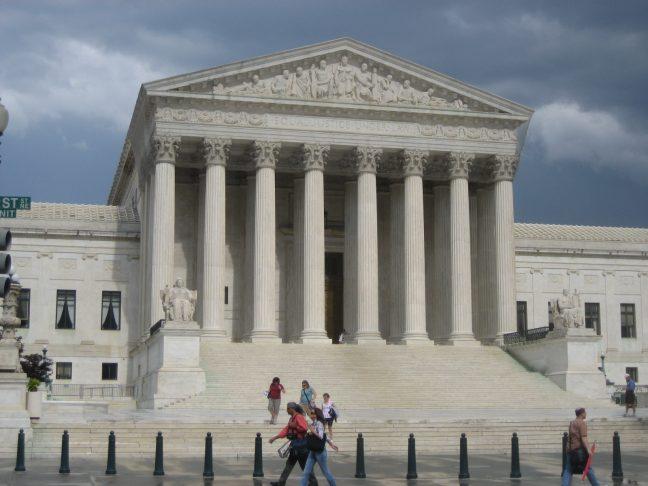Monday night a divided Senate voted to confirm Judge Amy Coney Barrett to the Supreme Court, Monday night, according to The New York Times.
Barrett’s nomination came quickly after the death of Justice Ruth Bader Ginsburg Sept. 18, with President Donald Trump announcing his intention to nominate Barrett to fill the empty position just 8 days later.
Article II of the Constitution articulates the proper process of nomination when a seat becomes vacant on the Court — the President nominates an individual, who then must be confirmed with a majority vote in the Senate. Holding a 53-45 majority in the Senate, Republicans have the votes needed to fill Ginsburg’s seat, and Democrats have little influence in delaying or stopping the confirmation.
Chair of the Political Science Department and professor at the University of Wisconsin David Canon conducts research in American political institutions, especially Congress. Canon said Barrett’s confirmation to the Supreme Court will have substantial impacts on the future of the institution, as well as on the nearing election.
Wisconsin Supreme Court rejects Green Party request to appear on November ballot
“Replacing Ruth Bader Ginsburg, one of the most liberal members on the Court, with Barrett, who would be one of the most conservative members — based on her decisions in appeals court and what we know about her background — would shift the balance of power in a significant way,” Canon said.
According to Canon, Barrett appears to be more conservative than Chief Justice John Roberts and Justice Brett Kavanaugh.
With Barrett on the Court, Justice Kavanaugh would become the median justice, with the ideological tilt becoming 6-3 in favor of conservatives, Canon said.
Wisconsin Supreme Court halts dissemination of absentee ballots in response to lawsuit
“This is significant for a variety of cases coming to the Court that in the past have been decided by a 5-4 margin,” Canon said. “Major decisions like the Affordable Care Act and abortion rights now could be tilting to the right.”
The implications of Barrett’s confirmation have many Democrats upset over the quick nomination process, which has the potential to set a record for the fastest time a person is confirmed to the Supreme Court in 45 years.
Democrats said Barrett’s nomination disregards a precedent set by Republicans in 2016, when Senate Republicans denied to hold hearings for former President Barrack Obama’s nominee to the Supreme Court, Merrick Garland, who was nominated 11 months before the election.
Pence visits Waukesha Wisconsin, promotes Trump, supreme court nominee
Canon said there may be backlash against a process seen as unfair by Democrats.
“There is a sense of injustice that is definitely firing up the Democratic base, and from what we know about voter behavior, people do tend to respond more strongly when they are mad about something,” Canon said.
Alea Sabry, a junior studying political science and molecular biology at UW, is closely following the nomination process of Barrett.
Sabry holds the position as Advocacy Trustee for the American Medical Student Association on campus, and is strongly encouraging members to vote in the nearing election, especially after a nomination process she views as unfair.
“I think the American people should definitely have a say in who fills Justice RBG’s seat, especially with the precedent set in 2016, and since we are only weeks before we hold a presidential election,” Sabry said.
Sabry said she is worried about Barrett’s confirmation to the Court, as the balance of power would be shifted towards conservatives and could result in the overturning of many policies she supports.
With the Supreme Court scheduled to hear arguments Nov. 10 on the legality of the ACA in Texas v. California, Sabry expressed her concern for the future of healthcare — like many other Democrats.
Sabry said as a future healthcare professional, she can’t ignore the implications of overturning the ACA.
“I do not think a lot of students realize the reason we’re allowed to stay on our parents’ healthcare insurance until we’re 26 is because of ACA,” Sabry said. “I am very afraid of the massive uncertainty surrounding the ACA and its potential absence, especially due to the lack of alternative healthcare plans currently in place.”
Keeley Collins, a communications student and social media director of College Republicans at UW, was glad Barrett was confirmed.
Collins said Barrett’s nomination is not the end of fairness in the Supreme Court system, and denies the belief that judicial behavior is fully partisan or can be predicted accurately based on confirmation hearings.
“As a Republican, we are all very happy about what is going on, and Trump pushing for this nomination,” Collins said.
‘It was an embarassment:’ First presidential debate leaves impression on experts
Collins encourages her peers to acknowledge the influential role the Supreme Court serves in determining social policies, especially for social issues college students are typically passionate about — such as abortion and gun rights — and voting in the election.
Professor of Political Science at UW specializing in electoral politics and representation, Barry Burden said this appointment will have a broad impact.
“The Supreme Court has the final word on a range of issues from policing practices to election laws to battles over administration policies — on everything from the Census to immigration,” Burden said. “Every seat matters because a shift of one vote can change the trajectory of the country on issues that actually matter in people’s everyday lives.”













